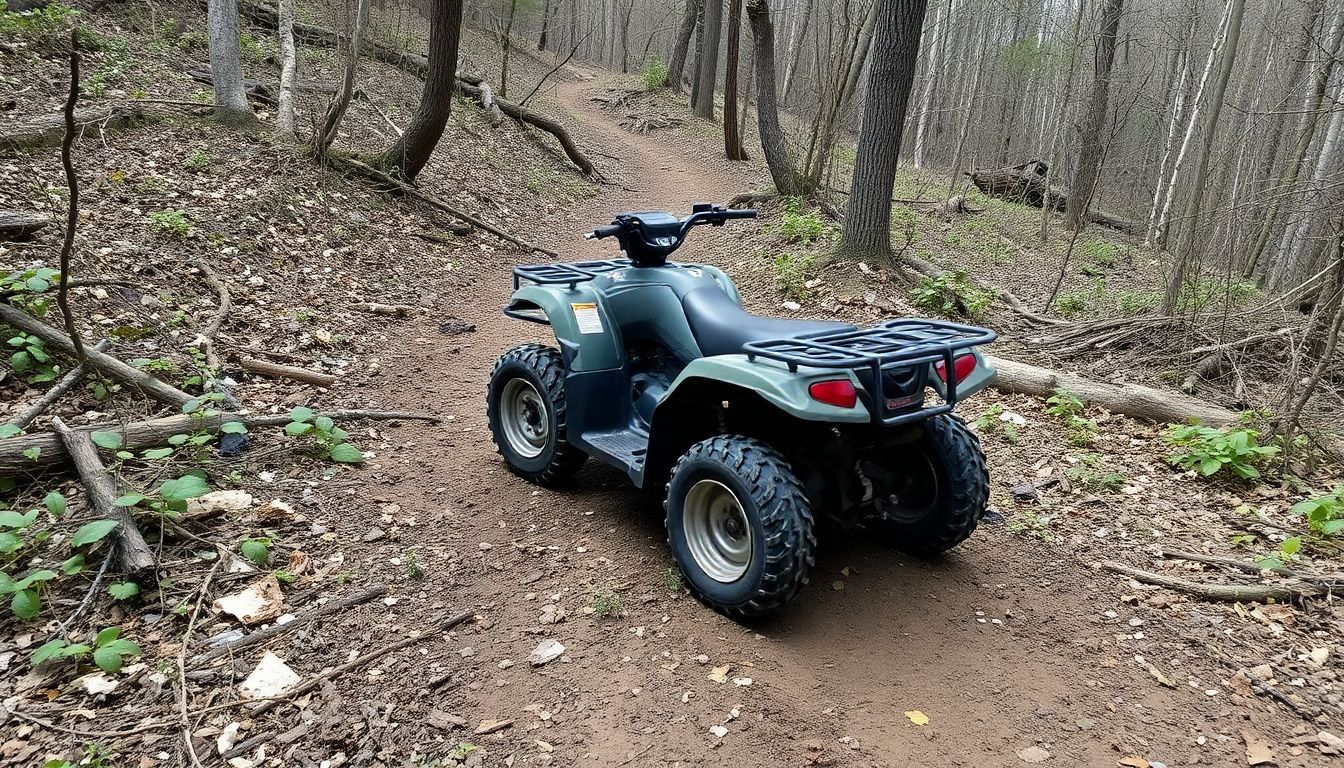ATV accidents can lead to serious injuries and complex legal issues. Each year, over 150,000 people visit emergency rooms due to ATV-related injuries. This article will explain liability and compensation in ATV accidents.
Learn how to protect your rights and get fair payment after an ATV crash.
Key Takeaways
- ATV accidents cause over 150,000 ER visits yearly, with children under 16 accounting for 25% of injuries.
- Liability in ATV crashes can involve riders, manufacturers, property owners, and government entities.
- Product defects, poor road conditions, and reckless driving are common causes of ATV accidents.
- Victims can seek compensation for medical bills, lost wages, pain and suffering, and property damage.
- Most states have a two-year time limit for filing ATV accident lawsuits, making prompt legal action crucial.
Common Causes of ATV Accidents

ATV accidents often stem from operator error, a leading cause of injuries and fatalities. Inexperienced riders, reckless driving, and speeding contribute to many crashes. The United States Consumer Product Safety Commission reports that in 2007, over 150,000 people visited emergency rooms due to ATV-related injuries.
Children under 16 face a higher risk, accounting for more than 25% of all ATV-related injuries.
Safety is not an accident, it is a choice. – Unknown
Manufacturer defects and negligent entrustment also play roles in ATV accidents. From 1982 to present, over 17,000 fatalities have been recorded from ATV accidents. Poor road conditions can lead to crashes, especially for untrained riders.
These factors, combined with a lack of safety gear, create a dangerous mix that often results in serious harm or death.
Determining Liability in ATV Accidents
Liability in ATV accidents often involves multiple parties. Riders, manufacturers, property owners, and even government entities may share responsibility. Courts look at factors like reckless driving, poor maintenance, and inadequate training to decide who’s at fault.
They also consider if anyone breached their duty of care, causing harm to others. As an ATV safety instructor, I’ve seen how small mistakes can lead to big accidents. That’s why it’s crucial for riders to follow safety rules and maintain their vehicles properly.
Proving negligence requires showing four key elements: duty of care, breach of duty, causation, and damages. For example, a rider who speeds and crashes into another ATV likely breached their duty to operate safely.
If that crash caused injuries and losses, the speeding rider could be held liable. But liability isn’t always clear-cut. Sometimes, blame is shared among parties. In those cases, a jury might split damages based on each party’s level of fault.
Victims should know that their compensation may be reduced if they’re found partly responsible for the accident.
Manufacturer Defects and Product Liability
ATV manufacturers must ensure their products are safe for use. Defects in design, manufacturing, or warnings can lead to serious accidents. Our firm has won large settlements for clients hurt by faulty ATVs.
We’ve seen cases where brake failures or steering issues caused crashes. In one case, two teens died when their ATV collided with a truck. Another involved a firefighter who crashed due to equipment problems.
Product liability claims require strong proof. Keeping the damaged ATV and helmet is key for building a case. We work with experts to find flaws in the vehicle’s parts or design. Manufacturers may face lawsuits for not fixing known issues or failing to warn riders of risks.
If you’ve been hurt, it’s vital to act fast and gather evidence. The law limits how long you have to file a claim after an ATV accident.
Road Conditions and Government Liability
Moving from manufacturer defects, we now turn to road conditions and government liability in ATV accidents. Unsafe trails and roads pose serious risks to ATV riders. The Federal Highway Administration reports that hazardous road conditions cause 30% of motorcycle accidents.
This statistic likely applies to ATVs as well. Damaged trails, poor maintenance, and lack of warning signs can lead to crashes.
Government agencies may be liable for accidents caused by unsafe road conditions. However, sovereign immunity often protects them from lawsuits. Exceptions exist if the agency knew about the danger but failed to fix it.
Victims must act fast to file claims against government entities. Many states, including Texas, require notice within six months. Texas also follows modified comparative negligence rules.
This means compensation may be reduced if the rider shares fault for the accident. From my experience handling these cases, gathering evidence quickly is crucial to prove government liability.
Compensation for ATV Accident Victims
ATV accident victims can seek compensation for various damages. These include medical bills, lost wages, pain and suffering, and property damage. Victims must prove negligence to recover these costs.
This means showing the other party had a duty of care, breached it, and caused harm. Insurance from the at-fault party often helps cover settlements. Keeping the ATV and helmet as evidence is key for lawsuits.
Victims should act fast to protect their rights. Parents can claim for child injuries on others’ ATVs without proper supervision. Drunk driving can make it harder to get money from other parties.
Victims may also get money for mental distress caused by the accident. A lawyer can help gather proof and fight for fair payment.
Additional Considerations for ATV Accident Claims
ATV accident claims involve several key factors that can impact your case’s outcome. Learn more about these crucial elements to protect your rights and maximize your compensation.
Legal Rights of Injured Passengers
Injured passengers in ATV accidents have specific legal rights. These rights vary based on state laws and the accident’s details. Passengers can seek money for medical bills, lost wages, and pain they suffer.
They may get help from different insurance policies, including the driver’s, the ATV owner’s, or their own.
Proving who is at fault in an ATV accident requires strong evidence. This includes eyewitness accounts, photos of the scene, and medical records. Time limits for filing lawsuits differ in each state.
Passengers must act fast to protect their rights and get fair payment. The next section will explore how product defects can affect ATV accident cases.
Statute of Limitations
ATV accident victims must act fast to file their claims. Georgia law sets a two-year time limit for most ATV accident lawsuits. This deadline starts on the date of the crash. For wrongful death cases, the clock begins on the day the person dies.
The law treats minors differently. Their time limit may pause until they turn 18. Filing quickly helps keep evidence fresh and makes a stronger case. Victims should know these deadlines to protect their rights to compensation.
Legal experts stress the importance of meeting these time limits. Missing the deadline can bar a victim from getting any money for their injuries. Courts rarely allow exceptions to these rules.
Prompt action also helps lawyers gather better proof and talk to witnesses while memories are clear. Knowing these time constraints helps victims plan their next steps after an ATV crash.
Importance of Professional Legal Assistance
After understanding the time limits for filing a claim, seeking professional legal help becomes crucial. Accident lawyers bring valuable expertise to ATV accident cases. They guide victims through complex legal processes and handle insurance negotiations.
Our firm has seen firsthand how legal counsel can boost compensation amounts for clients.
Legal representation offers many benefits to accident victims. Attorneys provide objective advice and allow injured parties to focus on recovery. They also help navigate tricky insurance company tactics aimed at reducing payouts.
In court, lawyers present strong arguments backed by evidence to support their clients’ claims. This support often leads to better outcomes in both settlements and trials.
The Importance of Working with an Attorney for Accident Claims
Working with an attorney for ATV accident claims is crucial. Lawyers like Cantor Injury Law specialize in these cases and offer free, confidential consultations. They handle various types of claims, including negligence, premises liability, and product liability.
Attorneys guide clients through the legal process and help secure compensation for medical bills, lost wages, and pain and suffering.
Legal experts provide vital support for injured ATV riders. The Low Law Firm, led by Tara Gilmore-Low, assists clients in getting the money they deserve. They take on cases with no fees until they win, making legal help accessible to all victims.
Skilled lawyers know how to deal with insurance companies and build strong cases for their clients.
Conclusion
ATV accidents can lead to serious injuries and complex legal issues. Understanding liability and compensation rights helps victims protect themselves. Seeking professional legal help ensures fair treatment from insurance companies.
Prompt action within legal time limits safeguards your rights to compensation. Knowledge of ATV accident laws empowers victims to make informed decisions about their cases.
FAQs
1. Who bears liability in ATV accidents?
Liability in ATV accidents often falls on multiple parties. The rider, landowner, or ATV manufacturer may be responsible. Factors like reckless driving, faulty equipment, or unsafe property conditions determine fault. Understanding these elements helps victims seek fair compensation.
2. What types of injuries are common in ATV crashes?
ATV crashes frequently result in severe injuries. Head trauma, spinal cord damage, and broken bones top the list. Riders may also suffer internal injuries or lacerations. These injuries can lead to long-term disabilities, making proper compensation crucial for recovery.
3. How does insurance coverage work for ATV accidents?
Insurance coverage for ATV accidents varies. Homeowners’ policies might cover incidents on private property. Separate ATV insurance offers broader protection. Some auto policies extend to ATVs. Check your coverage to ensure you’re protected. Adequate insurance safeguards against financial hardship after an accident.
4. What steps should I take after an ATV accident?
After an ATV accident, prioritize safety and health. Seek medical attention immediately. Document the scene with photos and gather witness information. Report the incident to relevant authorities. Contact an experienced attorney to protect your rights. Quick action improves your chances of fair compensation.
References
- https://www.leinlawoffices.com/top-causes-atv-accidents/ (2023-08-29)
- https://parisifirm.com/atv-accident-lawyer/liability-in-atv-accidents/
- https://www.callahan-law.com/understanding-the-legalities-of-an-atv-accident/
- https://www.lawinfo.com/resources/car-accident/atv-accidents/product-liability-and-atvs-can-manufacturers-be-held-accountable.html (2024-06-20)
- https://www.mainorellis.com/navigating-product-liability-claims-for-defective-atv-parts/
- https://lowlawfirm.com/liability-in-motorcycle-and-atv-accidents-whos-at-fault/
- https://www.justia.com/injury/motor-vehicle-accidents/atv-accidents/ (2024-10-15)
- https://mgalaw.com/the-legal-rights-of-injured-passengers-in-atv-and-off-road-vehicle-accidents/
- https://nmjfirm.com/atv/statute-of-limitations-in-georgia-atv-accident-cases-when-to-file-a-claim/
- https://www.colina.law/understanding-the-role-of-insurance-companies-in-atv-accident-claims/
- https://snyderwenner.com/understanding-personal-injury-attorneys-and-atv-accidents/
- https://www.oklalegal.com/blog/why-you-should-contact-a-lawyer-after-an-atv-accident/ (2024-02-29)

